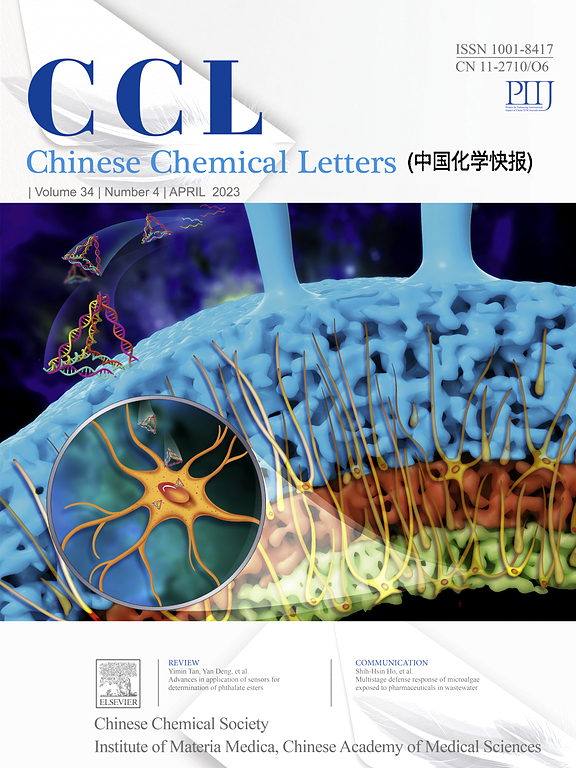Enhanced durability of a novel thiol-epoxy network thermosets with excellent hygrothermal and chemical resistance
IF 9.4
1区 化学
Q1 CHEMISTRY, MULTIDISCIPLINARY
引用次数: 0
Abstract
Epoxy resin is widely used in electronic packaging due to its exceptional performance, particularly the low-temperature curable thiol/epoxy system, which effectively minimizes thermal damage to sensitive electronic components. However, the majority of commercial thiol curing agents contain hydrolysable ester bonds and lack rigid structures, which induces most of thiol/epoxy systems still suffering from unsatisfactory heat resistance and hygrothermal resistance, significantly hindering their application in electronic packaging. In this study, we synthesized a tetrafunctional thiol compound, bis[3-(3-sulfanylpropyl)-4-(3-sulfanylpropoxy)phenyl]sulfone (TMBPS) with rigid and ester-free structures to replace traditional commercial thiol curing agents, pentaerythritol tetra(3-mercaptopropionate) (PETMP). Compared to the PETMP/epoxy system, the TMBPS/epoxy system exhibited superior comprehensive properties. The rigid structures of bisphenol S-type tetrathiol enhanced the heat resistance and mechanical properties of TMBPS/epoxy resin cured products, outperforming those of PETMP/epoxy resin cured products. Notably, the glass transition temperature of TMBPS/epoxy resin cured products was 74.2 °C which was 11.8 °C higher than that of PETMP cured products. Moreover, the ester-free structure in TMBPS contributed to its enhanced resistance to chemicals and hygrothermal conditions. After undergoing 1000 h of high-temperature and high-humidity aging, the tensile strength and adhesion strength of TMBPS-cured products were 73.33 MPa and 3.39 MPa, respectively exceeding 100% and 40% of their initial values, while PETMP-cured products exhibited a complete loss of both tensile strength and adhesion strength. This study provides a strategy for obtaining thermosetting polymers that can be cured at low temperatures and exhibit excellent comprehensive properties.

提高新型硫醇-环氧网络热固性塑料的耐久性,使其具有优异的耐湿热性和耐化学性
环氧树脂因其优异的性能被广泛应用于电子封装,特别是低温固化的硫醇/环氧树脂体系,有效地减少了对敏感电子元件的热损伤。然而,大多数商业硫醇固化剂含有可水解酯键,缺乏刚性结构,这导致大多数硫醇/环氧树脂体系的耐热性和耐湿热性仍然不理想,严重阻碍了它们在电子封装中的应用。在本研究中,我们合成了一种具有刚性和无酯结构的四功能硫醇化合物,双[3-(3-磺胺基丙基)-4-(3-磺胺基丙氧基)苯基]砜(TMBPS),以取代传统的商业硫醇固化剂,季戊四醇四(3-巯基丙酸)(PETMP)。与PETMP/环氧树脂体系相比,TMBPS/环氧树脂体系具有更好的综合性能。双酚s型四硫醇的刚性结构提高了TMBPS/环氧树脂固化制品的耐热性和力学性能,优于PETMP/环氧树脂固化制品。值得注意的是,TMBPS/环氧树脂固化产物的玻璃化转变温度为74.2 °C,比PETMP固化产物高11.8 °C。此外,TMBPS的无酯结构有助于增强其耐化学品和湿热条件。高温高湿老化1000 h后,tmbps固化产品的抗拉强度为73.33 MPa,粘接强度为3.39 MPa,分别超过了初始值的100%和40%,而petmp固化产品的抗拉强度和粘接强度完全消失。该研究为获得可在低温下固化并具有优异综合性能的热固性聚合物提供了一种策略。
本文章由计算机程序翻译,如有差异,请以英文原文为准。
求助全文
约1分钟内获得全文
求助全文
来源期刊

Chinese Chemical Letters
化学-化学综合
CiteScore
14.10
自引率
15.40%
发文量
8969
审稿时长
1.6 months
期刊介绍:
Chinese Chemical Letters (CCL) (ISSN 1001-8417) was founded in July 1990. The journal publishes preliminary accounts in the whole field of chemistry, including inorganic chemistry, organic chemistry, analytical chemistry, physical chemistry, polymer chemistry, applied chemistry, etc.Chinese Chemical Letters does not accept articles previously published or scheduled to be published. To verify originality, your article may be checked by the originality detection service CrossCheck.
 求助内容:
求助内容: 应助结果提醒方式:
应助结果提醒方式:


